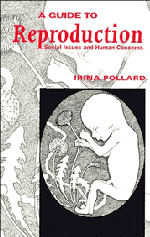Book contents
- Frontmatter
- Contents
- Preface and acknowledgements
- Part one Reproductive biology
- 1 Fertility and infertility
- 2 Sex determination and gamete maturation
- 3 Neuroendocrine control of puberty
- 4 Control of the menstrual cycle
- 5 The testis and control of spermatogenesis
- 6 Sexual behaviour and pheromones
- 7 Sociobiology and reproductive success
- 8 Fertilization and the initiation of development
- 9 Maternal physiology during gestation and fetal development
- 10 Parturition and lactation: hormonal control
- 11 Parental behaviour and the physiology of the neonate
- 12 Decline in male reproduction and the menopause
- Part two Reproduction and social issues
- Index
1 - Fertility and infertility
Published online by Cambridge University Press: 05 June 2012
- Frontmatter
- Contents
- Preface and acknowledgements
- Part one Reproductive biology
- 1 Fertility and infertility
- 2 Sex determination and gamete maturation
- 3 Neuroendocrine control of puberty
- 4 Control of the menstrual cycle
- 5 The testis and control of spermatogenesis
- 6 Sexual behaviour and pheromones
- 7 Sociobiology and reproductive success
- 8 Fertilization and the initiation of development
- 9 Maternal physiology during gestation and fetal development
- 10 Parturition and lactation: hormonal control
- 11 Parental behaviour and the physiology of the neonate
- 12 Decline in male reproduction and the menopause
- Part two Reproduction and social issues
- Index
Summary
Since the 1950s, biologists have contributed greatly to advances in the reproductive sciences and medicine. The essence of this reproductive revolution has been its unifying character. Contributions from the disciplines of genetics, biochemistry, prenatal medicine, immunology, epidemiology, socioanthropology and ecological ethics have provided choices, accelerated social change and rewarded procreation through improved health. Despite these new opportunities, medical technology is not the only essential for solving many of our problems because health determinants, particularly reproductive health, are usually more dependent on increased political awareness and a rising socioeconomic level. The unhealthy aspects of reproduction are intimately connected through the stresses of severe crowding, poverty, inequality of resource distribution and political instability. Issues of human concern, including the consequences of unregulated fertility, infertility, infant/maternal mortality, intrauterine growth retardation, congenital abnormality, sexually-transmitted disease and environmental deterioration, are the central themes of this book and are integrated into the various chapters dealing with theories and principles of human reproductive function.
HEALTH DETERMINANTS
Reproductive health is predetermined by genetic endowment and by environment but it can be improved or undermined by individual behaviour, advanced by better socioeconomic conditions and changed by medical knowledge and services. Improved medical social services are essential to the raising of reproductive health but can only be effective if they facilitate the necessary changes in human behaviour. Health, as defined in the Constitution of the World Health Organization (WHO), is a state of ‘complete physical, mental and social well-being not merely the absence of disease or infirmity’, succinctly emphasizing the positive aspects of a realised potential. For reproductive health, three basic interconnected elements have to be satisfied.
- Type
- Chapter
- Information
- A Guide to ReproductionSocial Issues and Human Concerns, pp. 3 - 20Publisher: Cambridge University PressPrint publication year: 1994



